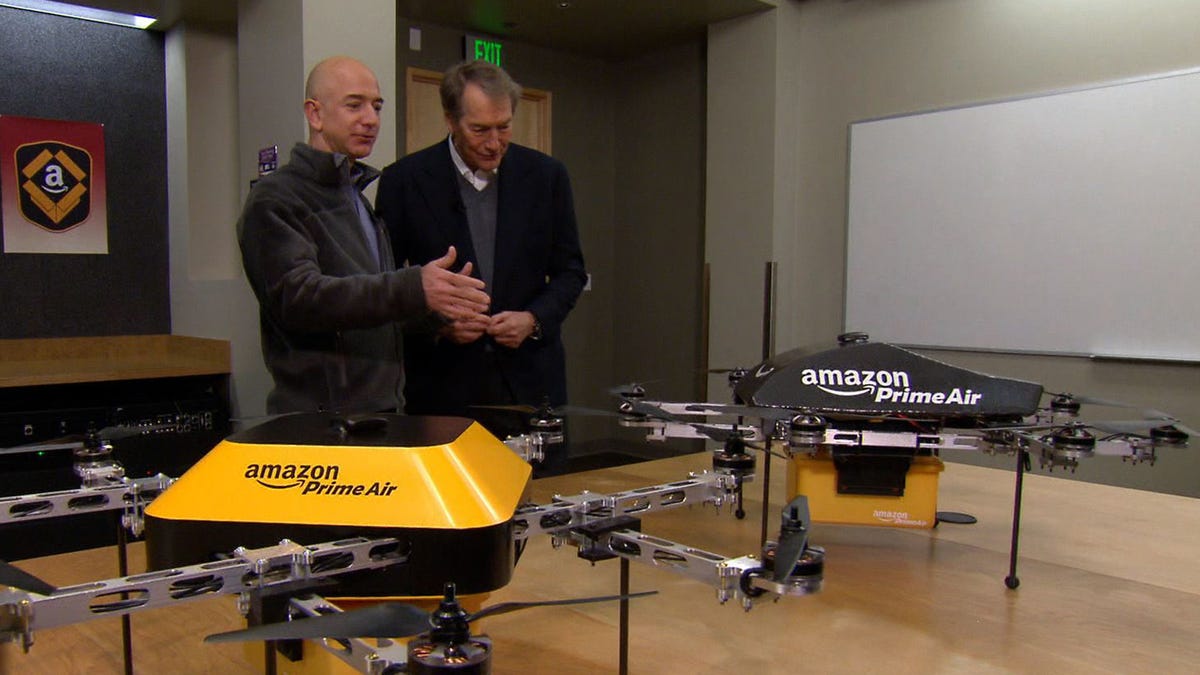Is there a Kindle Drone in Amazon's future?
<b>commentary</b> Amazon could pivot its drone development into a consumer product that provides a number of functions that make it as useful as other computing devices.

On the eve of Cyber Monday, Jeff Bezos conveniently created some buzz for Amazon with his "60 Minutes" reveal of Amazon Prime Air, an eight-propeller drone that will carry packages from the company's fulfillment centers to customers' doorsteps within 30 minutes of order placement.
Amazon drones aren't going into service anytime soon, if ever. The Federal Aviation Administration will take years to sort out the rules and regulations for commercial drones. Bezos is known for taking the long view, and he will continue to invest in turning what looks like a promotional gimmick into a business differentiator.
A fleet of drones at Amazon's more than 100 fulfillment centers around the world could eliminate more costly ground transportation and offer more timely service for some items. But as in other things Amazon does, Bezos may have a bigger ambition for drones than just package delivery.
As the technology evolves, drones will become smaller, faster, smarter, and cheaper -- just like computers, tablets, and phones -- leading to an era of personal drones. Amazon could pivot its drone development into a consumer product -- a Kindle Fire Drone, for instance -- that provides a number of functions that make it as useful as other computing devices.
For example, a Kindle Drone the size of a baseball and loaded with sensors and a camera could act as sentinel, roaming the house sniffing for trouble and sending data and imagery when necessary to alert the owner. The same drone outfitted with a simple robotic attachment could be used to retrieve objects, intersecting with the Internet of Things and beacons. If you leave your phone in the bedroom, just say, "OK Kindle, bring me my phone." Or it could deliver cupcakes or old-fashioned magazines to the neighbor down the street.
Of course, a personal drone doesn't quite fit into Amazon's goal to funnel people into its shopping vortex. But there are futuristic scenarios where a personal drone, or robot, makes perfect sense. A Kindle Drone could accompany you to stores, quietly hovering on your shoulder like a hummingbird, responding to natural language commands, automatically identifying objects via its camera, checking prices to see if Amazon offers a better deal, and even placing orders. A tablet, phone, or Google Glass-like device can offer similar functionality, but it can't be in two places at once. You can send your drone on reconnaissance missions.
Not everything Amazon does is related directly to shopping. Amazon Web Services grew out of the company's need to super-scale its infrastructure, and it now contributes about 10 percent of its $75 billion in revenue. That's not to say Amazon will get into the personal drone or robot business, but Bezos has a keen interest in disruptive technology of the future.
In a 1997 letter to shareholders, Bezos wrote that Amazon's management and employees "are working to build something important, something that matters to our customers, something that we can tell our grandchildren about." Becoming the Boeing of personal drones, in addition to the Internet's superstore and infrastructure provider, would be something amazing to tell his grandchildren.
< scale="noscale" salign="lt" type="application/x-shockwave-flash" background="#000000" width="620" height="349" allowFullScreen="true" allowScriptAccess="always" FlashVars="type=embed&si=254&pid=fY2cQBTRQRdg&url=http://www.cbsnews.com/test />
